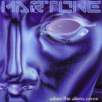Welcome fellow players of the best instrument in the world! I have decided to continue on within the same playing field of my last column addressing the colour of -7b5 of dominant chords this time looking at them in a three octave approach . Examples 1 through 4 are the stock versions of the arpeggios while versions 5 through 8 have more of the "interesting rolls of sound" in them.
I have simply taken a Minor7b5 arpeggio ( 1, b3, b5, b7) and worked it out through 3 octaves in all inversions incorporating some tapped notes in the process.
Example #1 starts in root position of the A-7b5 arpeggio over the chord F7. Watch specified fingering to avoid crashes. Examples #2, 3 and 4 are the same idea just working through the 1st, 2nd, and 3rd inversions of the arpeggio still over the same chord. You will notice that some fingerings will feel easier than others. I am especially fond of the way example #3 feels under the fingers.
Click here for examples (in .pdf format; requires Adobe Acrobat Reader).
Example #5 starts with what feels like a roll under your fingers and is also in groups of six notes. I am basically approaching each starting note in the inversions with an approach note and working it through 3 octaves. This one piviots from the note A to G and back to A.
I find the best way to practice this is to get the left hand just cycling the following 6 note pattern and not worrying about the tapped note yet. Start the example with a hard tap of your 3rd finger on your left hand hitting the note A. Continue through with the G, A, C, and Eb replacing the tapped note with the note C that was just played. Just cycle this for days making your left hand act more as "the keys on an old type-writer" than your own hand. I find this works better than the pull-offs. Once you have this, then take out the C note and replace it with the tapped note G.
Examples 6, 7, and 8 are the same thing through the inversions again.
Please realize that there are no picked notes in any of these examples. Your left hand strength will sure to be increased and your forearm should swell to twice the normal size!
Try these on your next dominant chord excursion and freak yourself out!
David Martone is a guitarist from Vancouver, Canada who has released seven solo CDs which showcase his musical diversity and brilliant guitarmanship.
His 2007 CD is entitled "When The Aliens Come", which features a progressive sound incorporating jazz, rock, fusion and metal influences.
